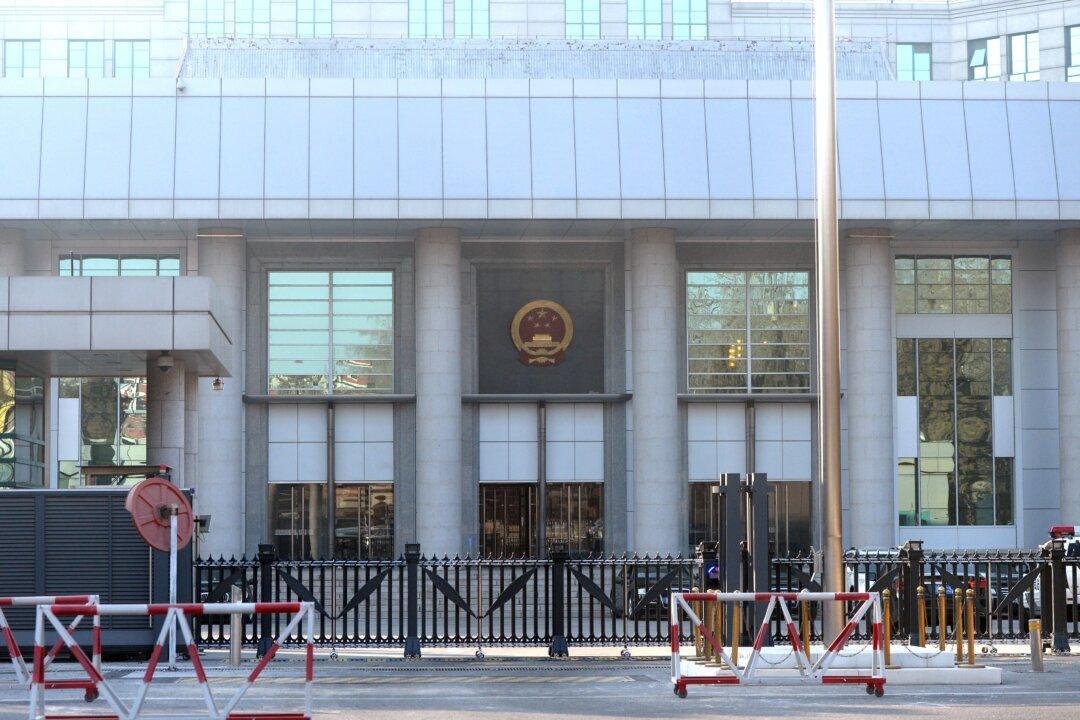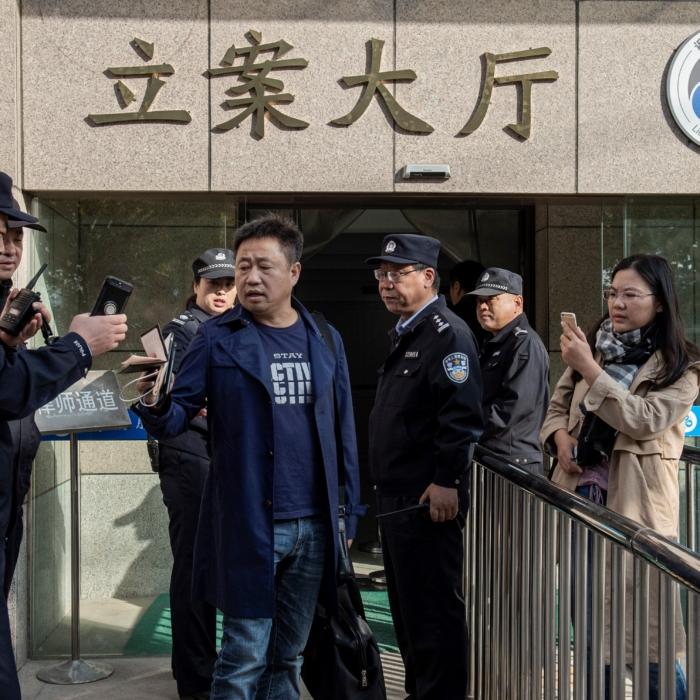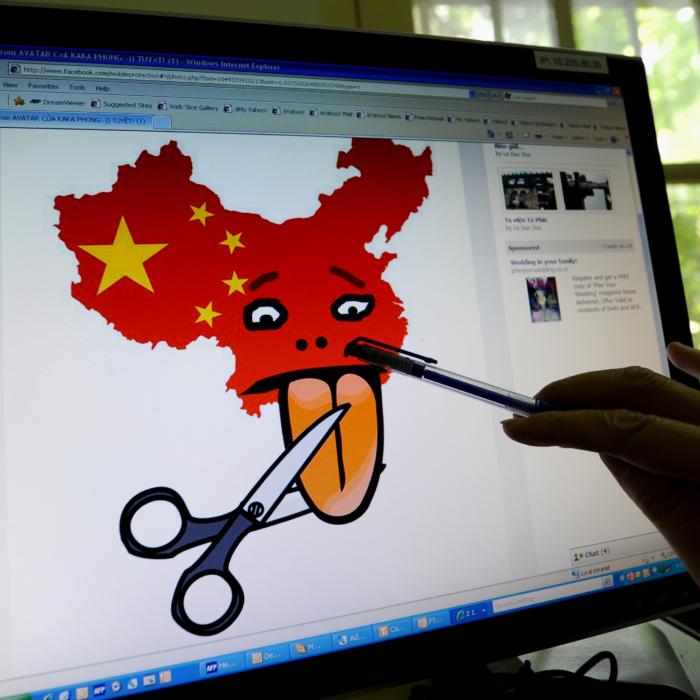A law firm intern has been blocked from obtaining a lawyer license for over seven years because he refused to join the party-affiliated lawyers’ association.
Alleged Trespassing
On March 21, Mr. Zhang posted his story online, “Qingdao police summoned me across provinces, accusing me of trespassing into the Qingdao Judicial Bureau. When I asked to see the subpoena, they flatly refused and forcibly took my phone, causing injuries to my fingers. They interrogated me, asking if I was aware that visiting the Qingdao Judicial Bureau without invitation was prohibited. I replied that I didn’t know. The police stripped me naked, wouldn’t even let me wear underwear, and made me change into prisoner’s clothing under constant surveillance. The interrogation lasted for eight hours; I’ve just been released.”Mr. Zhang told the Chinese-language edition of The Epoch Times that they finally released him after four o'clock the next morning.
“They claimed that I entered the Qingdao Judicial Bureau without permission. It is just ridiculous,” said Mr. Zhang.
According to Mr. Zhang, in January this year, to apply for an internship assessment, he visited the Qingdao Judicial Bureau in the northeastern province of Shandong. The director of the law firm where he interned, Yu Kai, and two others went with him.
After presenting their lawyer credentials, they were allowed entry into the Qingdao Judicial Bureau by swiping their cards. However, they were unable to meet the official in charge of the matter. Instead, they recorded a video at the entrance of the Qingdao Judicial Bureau as a record.
He explained that it’s been more than seven years since he passed the judicial exam. According to Chinese regulations, after passing the judicial exam, candidates must complete a one-year internship at a law firm or legal department before they are licensed as lawyers.
However, Mr. Zhang has been unable to obtain a license to practice law for seven years.
He said the reason why he has been denied a license is his continuous opposition to the “officially sanctioned ACLA,” which led to his blacklisting by the Ministry of Justice. Consequently, the local judicial bureau has obstructed the progress, refusing to issue him a license for the past seven years.
Since July 2018, Mr. Zhang has been an intern at a law firm in Shenzhen before transferring to the Xiaolin Law Firm in Shandong.
By January 2024, after completing a one-year internship in Shandong, he became eligible to participate in the interview process, which, upon passing, would grant him a lawyer’s license and allow him to practice law officially.
However, personnel from the Qingdao Judicial Bureau stated their reluctance to let him pass the interview and refused to issue him a lawyer’s practicing certificate. Despite multiple communications between his law firm and the Qingdao Judicial Bureau, the latter has consistently failed to provide specific reasons for denying his interview passage and refusing to issue him a lawyer’s license.
He visited the Qingdao Judicial Bureau on Jan. 27 in an effort to defend his rights, which ultimately resulted in the recent cross-provincial summons by the Qingdao police without a subpoena order, alleging disruption of order.
The Symbiotic ACLA and Judicial System
It all started in 2018 when Mr. Zhang, an intern in Shenzhen, reported suspicions of tax evasion and tax fraud by ACLA.On Nov. 4, 2023, on the Chinese social media platform Weibo, he publicly criticized the strict control imposed by the judicial authorities on lawyers, forcing them to join the ACLA, whose leaders were elected through fraudulent elections. He stated, “The red and corrupt lawyers manipulate and exploit others, engaging in bribery and illicit activities, while honest lawyers find it extremely difficult to carry out their duties of upholding the law.”
He told The Epoch Times that the ACLA appears to be elected by lawyers, but in reality, it’s all a sham. He said, “It’s controlled by cronies of the judicial bureau. After the internship period, interns have to go through an interview conducted by local branches of ACLA. Only after passing this interview can they obtain a practice license.”
The so-called interview before granting a license was based on regulations from the ACLA, according to Mr. Zhang. He said, “The ACLA secretly issued a document that bypassed the law.”
He explained that the criteria for the interview solely depend on the subjective interpretation of the ACLA. “If they say you’re qualified, you’re qualified; if they say you’re not, you’re not. There are no clear standards,” he admitted. “I’ve been interning for seven years and still don’t know what would qualify someone as competent.”
He described the relationship between the judicial bureau and the ACLA as symbiotic, where members of the ACLA are merely puppets of the judicial bureau, obedient to its commands. He speculated that the Ministry of Justice profits from the fees collected by the interviews, and his opposition threatened the interests of the relevant entities, which justifies his belief that the Ministry of Justice blacklisted him.
According to a report by RFI, there were more than 250,000 lawyers and 20,000 law firms at the end of 2014. Calculated based on the average annual personal dues of each lawyer of 1,000 yuan ($138) and the annual unit dues of law firms of 6,000 yuan ($831) in recent years, the annual personal dues of national lawyers were 250 million yuan ($34.63 million), and the annual unit dues of national law firms were 120 million yuan (16.62 million), totaling approximately 370 million yuan (approximately $51 million).
However, regarding the whereabouts and accounts of the above-mentioned membership fees, the lawyer’s associations at all levels have never publicized their balance books to lawyers and law firms, according to the report.
On Dec. 25, 2023, Mr. Zhang directly criticized on Weibo the ACLA’s mandatory annual assessment for lawyers to maintain their license to practice.
On Jan. 15, 2024, he once again pointed fingers at the ACLA, accusing it of “overstepping judicial authority, extorting money from lawyers, and engaging in daily extortion and racketeering activities.”
In recent years, Mr. Zhang has also participated in reporting bribery cases involving some ACLA presidents. For example, former President of the Shenzhen Lawyers Association Lin Changchi was reported to have bribed judges with 200,000 yuan ($27,700), and former President of the Qingdao Lawyers Association Zhang Jinhai was reported to have bribed officials in the education system with 5,000 euros ($5,426). According to Chinese media reports, both presidents were reportedly punished by the Chinese authorities.
Mr. Zhang questioned the legality of lawyers being forced to join the ACLA and the necessity of law firms undergoing annual assessments by the association. He asked, “Why must lawyers join the lawyers’ association and pay dues every year?” He further questioned, “Are lawyers the only profession forced to conduct study [of the party line] by the lawyers’ association?”
Mr. Zhang told The Epoch Times that in China, there is no law; power reigns supreme.
“The authorities can do as they please without any rules or order. The National People’s Congress and the ACLA are both puppets, and all elections are fake. The law is not meant to protect human rights but to strip them away. In a rule-of-law country, laws confine power, but in China, laws confine the people. There is not a single free person among the Chinese populace,” he said.
He wanted to warn overseas Chinese not to return to China. He said, “Once you come here, you’re a prisoner; don’t ever come back.”
He also stated his decision to lodge a formal complaint with the United Nations Human Rights Council.
“According to the Human Rights Convention, individuals have the freedom of association. This right is also guaranteed in China’s constitution. However, the ACLA mandates membership, which is a serious violation of the Constitution and the law. This is evil,” he said.






